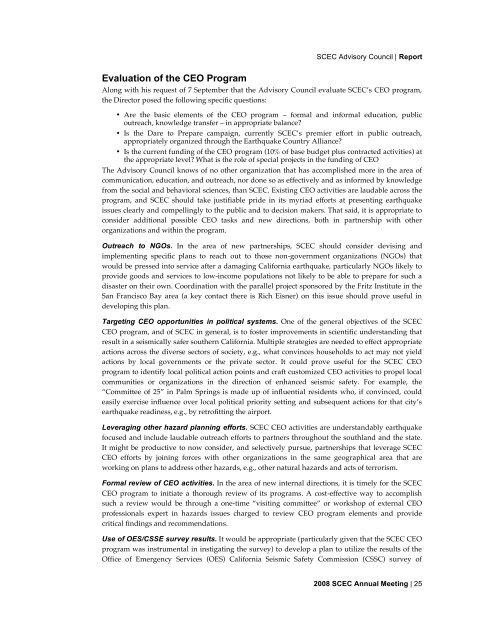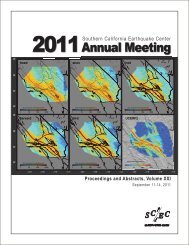Annual Meeting - SCEC.org
Annual Meeting - SCEC.org
Annual Meeting - SCEC.org
- TAGS
- annual
- meeting
- www.scec.org
Create successful ePaper yourself
Turn your PDF publications into a flip-book with our unique Google optimized e-Paper software.
<strong>SCEC</strong> Advisory Council | Report<br />
Evaluation of the CEO Program<br />
Along with his request of 7 September that the Advisory Council evaluate <strong>SCEC</strong>’s CEO program,<br />
the Director posed the following specific questions:<br />
• Are the basic elements of the CEO program – formal and informal education, public<br />
outreach, knowledge transfer – in appropriate balance?<br />
• Is the Dare to Prepare campaign, currently <strong>SCEC</strong>’s premier effort in public outreach,<br />
appropriately <strong>org</strong>anized through the Earthquake Country Alliance?<br />
• Is the current funding of the CEO program (10% of base budget plus contracted activities) at<br />
the appropriate level? What is the role of special projects in the funding of CEO<br />
The Advisory Council knows of no other <strong>org</strong>anization that has accomplished more in the area of<br />
communication, education, and outreach, nor done so as effectively and as informed by knowledge<br />
from the social and behavioral sciences, than <strong>SCEC</strong>. Existing CEO activities are laudable across the<br />
program, and <strong>SCEC</strong> should take justifiable pride in its myriad efforts at presenting earthquake<br />
issues clearly and compellingly to the public and to decision makers. That said, it is appropriate to<br />
consider additional possible CEO tasks and new directions, both in partnership with other<br />
<strong>org</strong>anizations and within the program.<br />
Outreach to NGOs. In the area of new partnerships, <strong>SCEC</strong> should consider devising and<br />
implementing specific plans to reach out to those non-government <strong>org</strong>anizations (NGOs) that<br />
would be pressed into service after a damaging California earthquake, particularly NGOs likely to<br />
provide goods and services to low-income populations not likely to be able to prepare for such a<br />
disaster on their own. Coordination with the parallel project sponsored by the Fritz Institute in the<br />
San Francisco Bay area (a key contact there is Rich Eisner) on this issue should prove useful in<br />
developing this plan.<br />
Targeting CEO opportunities in political systems. One of the general objectives of the <strong>SCEC</strong><br />
CEO program, and of <strong>SCEC</strong> in general, is to foster improvements in scientific understanding that<br />
result in a seismically safer southern California. Multiple strategies are needed to effect appropriate<br />
actions across the diverse sectors of society, e.g., what convinces households to act may not yield<br />
actions by local governments or the private sector. It could prove useful for the <strong>SCEC</strong> CEO<br />
program to identify local political action points and craft customized CEO activities to propel local<br />
communities or <strong>org</strong>anizations in the direction of enhanced seismic safety. For example, the<br />
“Committee of 25” in Palm Springs is made up of influential residents who, if convinced, could<br />
easily exercise influence over local political priority setting and subsequent actions for that city’s<br />
earthquake readiness, e.g., by retrofitting the airport.<br />
Leveraging other hazard planning efforts. <strong>SCEC</strong> CEO activities are understandably earthquake<br />
focused and include laudable outreach efforts to partners throughout the southland and the state.<br />
It might be productive to now consider, and selectively pursue, partnerships that leverage <strong>SCEC</strong><br />
CEO efforts by joining forces with other <strong>org</strong>anizations in the same geographical area that are<br />
working on plans to address other hazards, e.g., other natural hazards and acts of terrorism.<br />
Formal review of CEO activities. In the area of new internal directions, it is timely for the <strong>SCEC</strong><br />
CEO program to initiate a thorough review of its programs. A cost-effective way to accomplish<br />
such a review would be through a one-time “visiting committee” or workshop of external CEO<br />
professionals expert in hazards issues charged to review CEO program elements and provide<br />
critical findings and recommendations.<br />
Use of OES/CSSE survey results. It would be appropriate (particularly given that the <strong>SCEC</strong> CEO<br />
program was instrumental in instigating the survey) to develop a plan to utilize the results of the<br />
Office of Emergency Services (OES) California Seismic Safety Commission (CSSC) survey of<br />
2008 <strong>SCEC</strong> <strong>Annual</strong> <strong>Meeting</strong> | 25



